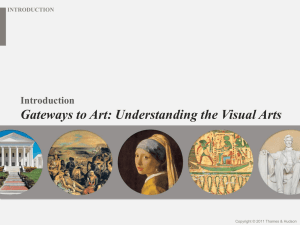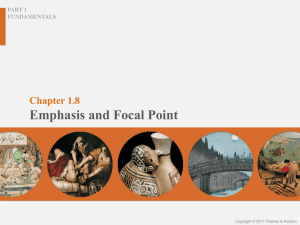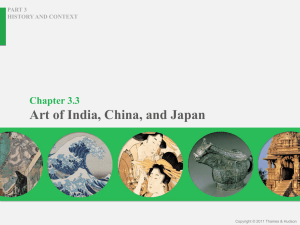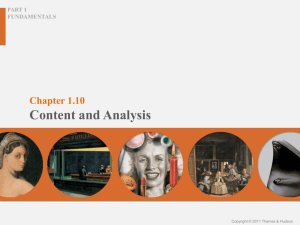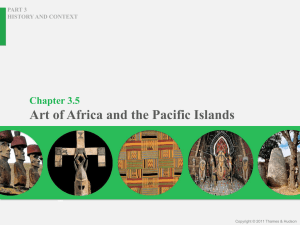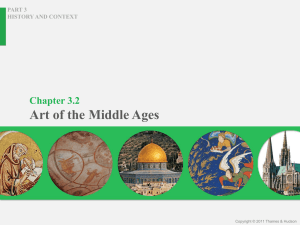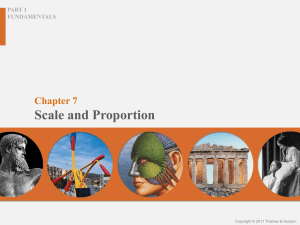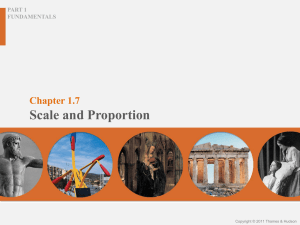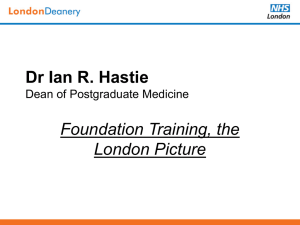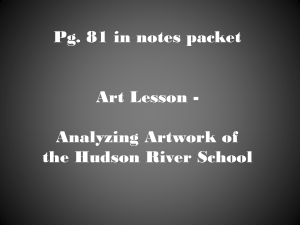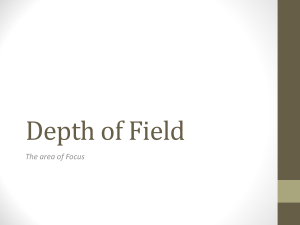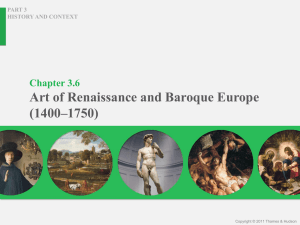1.08 (Emphasis and Focal Point)
advertisement
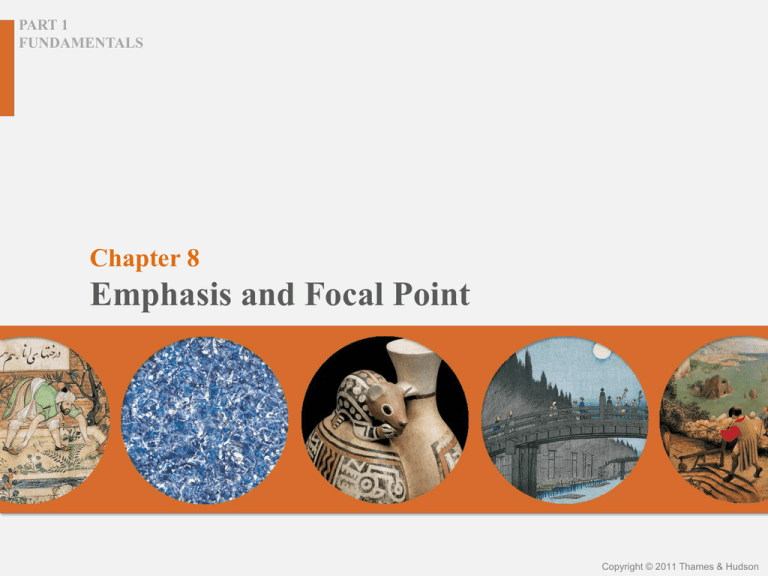
PART 1 FUNDAMENTALS Chapter 8 Emphasis and Focal Point Copyright © 2011 Thames & Hudson Chapter 8 Emphasis and Focal Point PART 1 FUNDAMENTALS Introduction Emphasis is the principle by which an artist draws attention to particular content in a work of art or design A focal point is a specific place of visual emphasis An artist can emphasize focal points through the use of line, implied line, value, color—any of the elements of art Emphasis and focal point usually accentuate concepts, themes, or ideas the artist wants to express Gateways to Art: Understanding the Visual Arts, Debra J DeWitte, Ralph M Larmann, M Kathryn Shields Copyright © 2011 Thames & Hudson Chapter 8 Emphasis and Focal Point PART 1 FUNDAMENTALS Emphasis and Subordination When an artist emphasizes different elements in a work of art, he or she creates visual relationships and connections between them The opposite of emphasis is subordination Subordination draws our attention away from certain areas of a work Gateways to Art: Understanding the Visual Arts, Debra J DeWitte, Ralph M Larmann, M Kathryn Shields Copyright © 2011 Thames & Hudson Chapter 8 Emphasis and Focal Point PART 1 FUNDAMENTALS Interactive Exercises: Emphasis and Subordination Click to start the Interactive Exercises Gateways to Art: Understanding the Visual Arts, Debra J DeWitte, Ralph M Larmann, M Kathryn Shields Copyright © 2011 Thames & Hudson 1.141 Double-chambered vessel with mouse, Recuay, Peru, 4th–8th century. Ceramic, 6” high. Metropolitan Museum of Art, New York Copyright © 2011 Thames & Hudson Chapter 8 Emphasis and Focal Point PART 1 FUNDAMENTALS Double-chambered vessel with mouse The mouse attracts our attention because it is so detailed The spout of the vessel also stands out, not only because of its color but also because of its geometric simplicity Third and fourth areas of emphasis are found in the decorations on the two chambers of the vessel These areas connect because they share common shapes, coloration, and texture that draw our attention away from the undecorated—subordinated—areas of the vessel Gateways to Art: Understanding the Visual Arts, Debra J DeWitte, Ralph M Larmann, M Kathryn Shields Copyright © 2011 Thames & Hudson 1.142 Jules Olitski, Tin Lizzie Green, 1964. Acrylic and oil/wax crayon on canvas, 10’10” x 6’10”. Museum of Fine Arts, Boston, Massachusetts Copyright © 2011 Thames & Hudson Chapter 8 Emphasis and Focal Point PART 1 FUNDAMENTALS Jules Olitski, Tin Lizzie Green Because abstract works can never directly evoke our memories of things or people, they frequently rely on compositional principles, such as emphasis Olitski frames our attention on the color field in the center of the work with three colored dots on the right, red horizontal strokes on the top and bottom, and a tancolored stroke on the left These color shapes support the real focus of this work, which is the blue-green color in the center Gateways to Art: Understanding the Visual Arts, Debra J DeWitte, Ralph M Larmann, M Kathryn Shields Copyright © 2011 Thames & Hudson 1.143 Mark Tobey, Blue Interior, 1959. Tempera on card, 44 x 28” Copyright © 2011 Thames & Hudson Chapter 8 Emphasis and Focal Point PART 1 FUNDAMENTALS Mark Tobey, Blue Interior When a work does not have areas of emphasis, that changes the way we respond to it Tobey was interested in creating a meditative response to the landscape of the Pacific Northwest, where he grew up Because Tobey does not use areas of emphasis, we are free to roam visually in his painting We can immerse ourselves in the work, as if it were an ocean Gateways to Art: Understanding the Visual Arts, Debra J DeWitte, Ralph M Larmann, M Kathryn Shields Copyright © 2011 Thames & Hudson Chapter 8 Emphasis and Focal Point PART 1 FUNDAMENTALS Focal Point A focal point is the specific part of an area of emphasis to which the artist draws our eye Gateways to Art: Understanding the Visual Arts, Debra J DeWitte, Ralph M Larmann, M Kathryn Shields Copyright © 2011 Thames & Hudson Chapter 8 Emphasis and Focal Point PART 1 FUNDAMENTALS Interactive Exercises: Focal Point Click to start the Interactive Exercises Gateways to Art: Understanding the Visual Arts, Debra J DeWitte, Ralph M Larmann, M Kathryn Shields Copyright © 2011 Thames & Hudson 1.144 Pieter Bruegel the Elder, Landscape with the Fall of Icarus, c. 1555–8. Oil on canvas, mounted on wood, 29 x 44 1/8”. Musées Royaux des Beaux-Arts de Belgique, Brussels, Belgium Copyright © 2011 Thames & Hudson Detail of Pieter Bruegel the Elder, Landscape with the Fall of Icarus Copyright © 2011 Thames & Hudson Detail of Pieter Bruegel the Elder, Landscape with the Fall of Icarus Copyright © 2011 Thames & Hudson Chapter 8 Emphasis and Focal Point PART 1 FUNDAMENTALS Pieter Bruegel the Elder, Landscape with the Fall of Icarus The story of Icarus is one from Greek mythology His wax wings melt as he flies too close to the sun Bruegel diverts our attention so that we barely notice Icarus plunging to his doom Instead the artist’s main area of emphasis is the plower in the foreground, possibly illustrating the proverb “No plough stands still because a man dies.” Gateways to Art: Understanding the Visual Arts, Debra J DeWitte, Ralph M Larmann, M Kathryn Shields Copyright © 2011 Thames & Hudson 1.145 Artemisia Gentileschi, Judith Decapitating Holofernes, c. 1620. Oil on canvas, 6' 6 3/8” x 5' 3 ¾“. Uffizi Gallery, Florence, Italy Copyright © 2011 Thames & Hudson Directional lines in Gentileschi's Judith Decapitating Holofernes Copyright © 2011 Thames & Hudson Chapter 1 Art in Two Dimensions: Line, Shape, and the Principle of Contrast PART 1 FUNDAMENTALS Gateway to Art: Gentileschi, Judith Decapitating Holofernes Emphasis Used to Create Drama Through Gentileschi’s use of directional line and contrasting values we are drawn irresistibly to the point where the climax of the story is unfolding Judith’s arms and those of her maidservant (visually connected to the sword itself) stretch toward the dark values of their victim’s head The light values of the five bare arms create strong directional lines that lead to the focal point where blood spurts from the violent attack on Holofernes’ neck Gateways to Art: Understanding the Visual Arts, Debra J DeWitte, Ralph M Larmann, M Kathryn Shields Copyright © 2011 Thames & Hudson Chapter 8 Emphasis and Focal Point PART 1 FUNDAMENTALS Emphasis and Focal Point in Action Artists can use direction, dramatic contrasts, and placement relationships to organize the elements in a work and draw our attention to areas of emphasis and focal points Gateways to Art: Understanding the Visual Arts, Debra J DeWitte, Ralph M Larmann, M Kathryn Shields Copyright © 2011 Thames & Hudson Chapter 8 Emphasis and Focal Point PART 1 FUNDAMENTALS Interactive Exercises: Drawing Attention Click to start the Interactive Exercises Gateways to Art: Understanding the Visual Arts, Debra J DeWitte, Ralph M Larmann, M Kathryn Shields Copyright © 2011 Thames & Hudson Chapter 8 Emphasis and Focal Point PART 1 FUNDAMENTALS Emphasis and Focal Point in Action: Line Line is an effective way to focus a viewer’s attention in an artwork Gateways to Art: Understanding the Visual Arts, Debra J DeWitte, Ralph M Larmann, M Kathryn Shields Copyright © 2011 Thames & Hudson 1.146 The Emperor Babur Overseeing his Gardeners, India, Mughal period, c. 1590. Tempera and gouache on paper, 8 ¾ x 5 5/8”. Victoria and Albert Museum, London, England Copyright © 2011 Thames & Hudson Detail of The Emperor Babur Overseeing his Gardeners showing directional lines Copyright © 2011 Thames & Hudson Chapter 8 Emphasis and Focal Point PART 1 FUNDAMENTALS The Emperor Babur Overseeing his Gardeners The gardener/artist Babur is pointing to a feature that channels water in four directions The strong diagonal of the channel draws our attention to the water as it runs toward us The central cross-shaped confluence of the waters becomes the focal point of the composition In this work, water is the focal point conceptually as well as visually Gateways to Art: Understanding the Visual Arts, Debra J DeWitte, Ralph M Larmann, M Kathryn Shields Copyright © 2011 Thames & Hudson Chapter 8 Emphasis and Focal Point PART 1 FUNDAMENTALS Emphasis and Focal Point in Action: Contrast Artists look to create effects of contrast by positioning elements next to one another that are very different For example, areas of different value, color, or size Gateways to Art: Understanding the Visual Arts, Debra J DeWitte, Ralph M Larmann, M Kathryn Shields Copyright © 2011 Thames & Hudson 1.147 Francisco de Zurbarán, The Funeral of St. Bonaventure, 1629. Oil on canvas, 8' 2” x 7' 4”. Musée du Louvre, Paris, France Copyright © 2011 Thames & Hudson Chapter 8 Emphasis and Focal Point PART 1 FUNDAMENTALS Francisco de Zurbarán, The Funeral of St. Bonaventure Most of the lightest values in the painting are reserved for the clothing adorning the dead body of St. Bonaventure These create a central focal point that stands out in contrast to the surrounding dark values The whiteness of his clothing symbolizes Bonaventure's spotless reputation Enough light value is distributed to the other figures to allow our eyes to be drawn away from the saint's body, making the composition more interesting Gateways to Art: Understanding the Visual Arts, Debra J DeWitte, Ralph M Larmann, M Kathryn Shields Copyright © 2011 Thames & Hudson Chapter 8 Emphasis and Focal Point PART 1 FUNDAMENTALS Emphasis and Focal Point in Action: Placement The placement of elements within a composition controls rhythm and creates multiple focal points Gateways to Art: Understanding the Visual Arts, Debra J DeWitte, Ralph M Larmann, M Kathryn Shields Copyright © 2011 Thames & Hudson 1.148 Ando Hiroshige, “Riverside Bamboo Market, Kyobashi,” from One Hundred Famous Views of Edo, 1857. 15 x 10 3/8”. James A. Michener Collection, Honolulu Academy of Arts, Hawaii Copyright © 2011 Thames & Hudson Chapter 8 Emphasis and Focal Point PART 1 FUNDAMENTALS Ando Hiroshige, “Riverside Bamboo Market, Kyobashi” The positions of the moon, the bridge, and the figure in a boat form three separate focal points Each shape commands our attention and draws more of our focus to the right side of the work The varying distances between the placements of the three focal points also create rhythm that adds visual interest Gateways to Art: Understanding the Visual Arts, Debra J DeWitte, Ralph M Larmann, M Kathryn Shields Copyright © 2011 Thames & Hudson Chapter 8 Emphasis and Focal Point PART 1 FUNDAMENTALS Conclusion All the elements and principles of art can serve to create emphasis Both actual and implied lines shape our examination of a work of art by directing the movement of our gaze Contrasts between different values, colors, or textures can sometimes be so dramatic and distinct that we cannot help but feel drawn to that area of a work Gateways to Art: Understanding the Visual Arts, Debra J DeWitte, Ralph M Larmann, M Kathryn Shields Copyright © 2011 Thames & Hudson Chapter 8 Emphasis and Focal Point PART 1 FUNDAMENTALS This concludes the PowerPoint Slide Set for Chapter 1.8 Gateways to Art: Understanding the Visual Arts By Debra J DeWitte, Ralph M Larmann, M Kathryn Shields Copyright © 2011 Thames & Hudson
